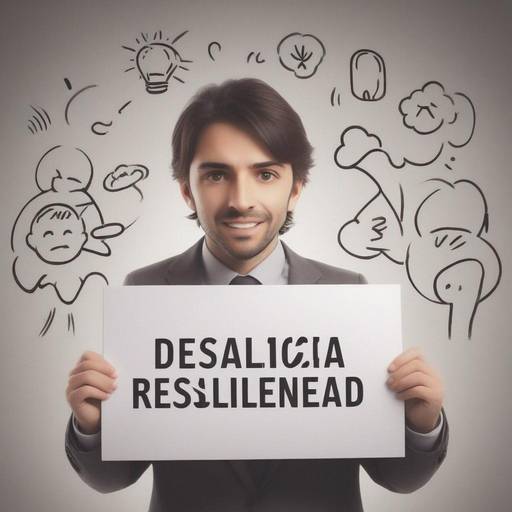
Resilience, understood as the ability to adapt and overcome adverse situations, is essential for personal growth and the confrontation of challenges. In this sense, the growth mentality plays a crucial role, as it promotes positive attitude, self-confidence and learning capacity. In this article, we will explore in depth the importance of the culture of growth in resilience, as well as its impact on personal development. From its historical origin to future perspectives, we will analyze each aspect in order to provide an integral understanding of the subject.
Introduction
The concept of growth mentality refers to belief in capacity for development and improvement through effort, perseverance, and resilience. This mentality is essential to overcome challenges and achieve goals, as it drives people to face adverse situations with optimism and determination. Resilience, for its part, is the ability to recover and adapt positively to the difficulties, allowing emotional strengthening and personal growth. Both concepts are closely related, as the growth mentality fosters resilient attitude, promoting overcoming obstacles and developing skills to deal with adverse situations.
History and Background
The notion of growth mentality has its roots in the theory of personal growth and the psychology of development. It emerged from studies conducted by psychologist Carol Dweck, who investigated people's attitudes and beliefs towards achievement and learning. Dweck proposed the existence of two types of mentalities: fixed and growth. The fixed mentality is characterized by the belief that skills and talents are static, while the growth mentality promotes the idea that capacities can be developed through effort and practice.
As for resilience, their study dates back to the 1960s, when researchers began to explore the ability of some people to cope with and recover from traumatic experiences. Over time, it has consolidated itself as a fundamental area of study in psychology and mental health, as it offers tools and strategies to face difficult situations and promote emotional well-being.
Analysis in Deep
Growth and resilience have multiple benefits at the personal, academic, professional and social levels. From the strengthening of self-esteem and motivation, to the development of coping and adaptation skills, these two qualities positively influence people's lives. On the other hand, the development of a culture of growth and the ability to be resilient are not without challenges. Fear of failure, lack of confidence or resistance to change are common obstacles that must be overcome through practice and the acquisition of emotional and cognitive tools.
Comprehensive review
The development of the culture of growth and resilience is manifested in many contexts, from the educational and labour sphere to interpersonal relations. The implementation of growth-minded strategies in education, for example, fosters the motivation of students, the spirit of learning and persistence in the face of difficulties. For its part, resilience in the working environment allows us to face stress, uncertainty and pressure, promoting a healthy and collaborative work environment.
In addition, it is important to consider the influence of the growth mentality and resilience on emotional well-being and mental health. The ability to face challenges with a positive attitude and the ability to overcome adversities are determining factors in building a strong and resilient mentality.
In this regard, it is essential to highlight the importance of intrinsic motivation, positive thinking and emotional management as fundamental pillars for fostering the culture of growth and resilience.
Comparative analysis
While the culture of growth and resilience has different objectives, both concepts share the capacity to promote personal development and strengthen the capacity to address challenges. The growth mentality focuses on belief in the capacity for change and improvement, while resilience focuses on the ability to recover from adversities.
Both concepts are closely related to personal development, as they promote self-determination, adaptability and learning capacity. The growth mentality drives people to overcome obstacles and seek opportunities for growth, while resilience allows them to face difficulties with emotional and mental strength.
Practical Tips and Accessible Recommendations
Promoting the culture of growth and cultivating resilience are fundamental to personal and professional development. Some practical tips for fostering these attitudes include:
- Cultivate self-discipline: Establish attainable goals and work constantly to achieve them, developing perseverance and determination.
- Learn from mistakes: See failures as learning and growth opportunities, building the ability to overcome obstacles and seek solutions.
- Develop emotional management: Learn to recognize, understand and regulate our emotions to face difficult situations with calm and mental clarity.
- Find community support: Cultivate healthy interpersonal relationships and seek the support of friends, family or colleagues to strengthen resilience and growth mentality.
Final Reflections and Frequently Asked Questions
In conclusion, the culture of growth and resilience are fundamental aspects in the pursuit of personal development and the ability to face the challenges of life. Fostering a positive attitude, confidence in the ability to change and emotional strength are determining factors for achieving emotional well-being and personal growth.
Frequently asked questions
1. What strategies can I use to develop a growth mentality?
Developing a growing mentality involves practicing perseverance, resilience, and opening to learning. Some strategies include setting challenging goals, celebrating effort and process, and seeking opportunities to learn continuously.
2. How can I strengthen my emotional resilience?
To strengthen emotional resilience, it is essential to cultivate self-consciousness, practice emotional management, seek community support and develop adaptive capacity to changes and adversities.
3. What is the importance of the mentality of growth in the labour sphere?
The mentality of growth in the workplace promotes motivation, innovation, and adaptability, fostering a collaborative and proactive working environment.
4. How can I apply the mentality of growth and resilience in my daily life?
You can apply the mentality of growth and resilience in your daily life by setting challenging goals, learning from mistakes, seeking the support of your loved ones, and practicing self-reflection and self-development.
5. What is the impact of the growth mentality on the development of skills and competencies?
The growth mentality promotes belief in development and improvement capacity, which drives people to acquire new skills, face challenges and seek opportunities for personal and professional growth.
6. To what extent does resilience contribute to emotional well-being and mental health?
Resilience contributes significantly to emotional well-being and mental health, as it promotes the ability to face stressful situations, overcome trauma and maintain a positive attitude, strengthening the ability to cope with difficulties with emotional and mental balance.
In short, the mentality of growth and resilience are fundamental aspects of personal development, promoting the ability to face challenges with determination, emotional strength and learning capacity. Cultivating these qualities can have a positive impact on all aspects of life, from academia and work to personal relationships and emotional well-being.
With this information, I hope you can understand the importance of the culture of growth in resilience and find practical strategies to cultivate these qualities in your daily life.
Remember that personal growth is a continuous journey, and fostering a culture of growth and resilience can open doors to self-development and integral well-being.
Face the challenges with confidence and grow with every experience you face!






















































